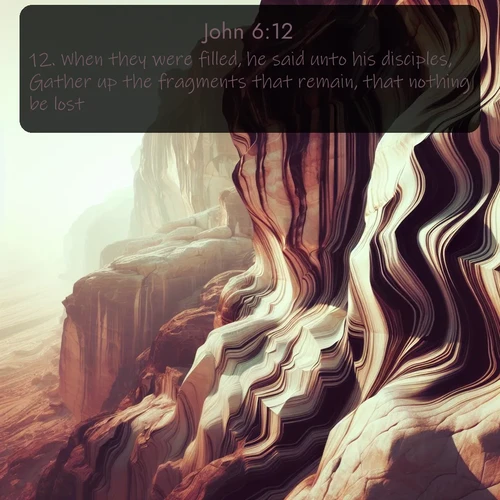Gospel of John 6:12 plusieurs versions / traductions
English Bible Translations
12. When they were filled, he said unto his disciples, Gather up the fragments that remain, that nothing be lost.
12. And when they were filled, he saith unto his disciples, Gather up the broken pieces which remain over, that nothing be lost.
12. And when they had had enough, Jesus said to his disciples, Take up the broken bits which are over, so that nothing may be wasted.
12. And when they had been filled, he says to his disciples, Gather together the fragments which are over and above, that nothing may be lost.
12. When they were satisfied, he said to his disciples, Gather the fragments that remain, that nothing may be lost.
12. And when they were filled, he saith to his disciples, `Gather together the broken pieces that are over, that nothing may be lost;'
German Bible Translations
12. Da sie aber satt waren, sprach er zu seinen Jüngern: Sammelt die übrigen Brocken, daß nichts umkommt.
12. Als sie aber gesättigt waren, sprach er zu seinen Jüngern: Sammelt die übriggebliebenen Brocken, damit nichts umkomme!
French Bible Translations
12. Lorsqu'ils furent rassasiés, il dit à ses disciples: «Ramassez les morceaux qui restent, afin que rien ne se perde.»
12. Lorsqu’ils furent rassasiés, il dit à ses disciples: Ramassez les morceaux qui restent, afin que rien ne se perde.
12. Lorsqu'ils furent rassasiés, il dit à ses disciples: Ramassez les morceaux qui restent, afin que rien ne se perde.
12. après qu'ils furent rassasiés, il dit à ses disciples: Amassez les morceaux qui sont de reste, afin que rien ne soit perdu.
12. Et après qu'ils furent rassasiés, il dit à ses Disciples : amassez les pièces qui sont de reste, afin que rien ne soit perdu.
12. Après qu'ils furent rassasiés, il dit à ses disciples: Ramassez les morceaux qui sont restés, afin que rien ne se perde.
Versions with Strong Codes
John 6 / KJV_Strong12. [G1161] When[G5613] they were filled,[G1705] he said[G3004] unto his[G848] disciples,[G3101]
Strong Code definitions
G1161 de/deh a primary particle (adversative or continuative); but, and, etc.:--also, and, but, moreover, now (often unexpressed in English).
G5613 hos/hoce probably adverb of comparative from G3739; which how, i.e. in that manner (very variously used, as follows):--about, after (that), (according) as (it had been, it were), as soon (as), even as (like), for, how (greatly), like (as, unto), since, so (that), that, to wit, unto, when(soever), while, X with all speed. see G3739
G1705 empiplemi/em-pip'-lay-mee from G1722 and the base of G4118;to fill in (up), i.e. (by implication) to satisfy (literally or figuratively):-fill. see G1722 see G4118
G3004 lego/leg'-o a primary verb; properly, to "lay" forth, i.e. (figuratively) relate (in words (usually of systematic or set discourse; whereas G2036 and 5346 generally refer to an individual expression or speech respectively; while 4483 is properly to break silence merely, and 2980 means an extended or random harangue)); by implication, to mean:--ask, bid, boast, call, describe, give out, name, put forth, say(-ing, on), shew, speak, tell, utter. see G2036 see G5346 see G4483 see G2980
G848 hautou/how-too' contracted for G1438; self (in some oblique case or reflexively, relation):-her (own), (of) him(-self), his (own), of it, thee, their (own), them(-selves), they. see G1438
G3101 mathetes/math-ay-tes' from G3129; a learner, i.e. pupil:--disciple. see G3129
G4863 sunago/soon-ag'-o from G4862 and 71; to lead together, i.e. collect or convene; specially, to entertain (hospitably):--+ accompany, assemble (selves, together), bestow, come together, gather (selves together, up, together), lead into, resort, take in. see G4862 see G71
G3588 ho/ho, including the feminine to to in all their inflections; the definite article; the (sometimes to be supplied, at others omitted, in English idiom):--the, this, that, one, he, she, it, etc.
G2801 klasma/klas'-mah from G2806; a piece (bit):--broken, fragment. see G2806
G4052 perisseuo/per-is-syoo'-o from G4053; to superabound (in quantity or quality), be in excess, be superfluous; also (transitively) to cause to superabound or excel:--(make, more) abound, (have, have more) abundance (be more) abundant, be the better, enough and to spare, exceed, excel, increase, be left, redound, remain (over and above). see G4053
G2443 hina/hin'-ah probably from the same as the former part of G1438 (through the demonstrative idea; compare 3588); in order that (denoting the purpose or the result):--albeit, because, to the intent (that), lest, so as, (so) that, (for) to. Compare 3363. see G1438 see G3588 see G3363
G5100 tis/tis an enclitic indefinite pronoun; some or any person or object:--a (kind of), any (man, thing, thing at all), certain (thing), divers, he (every) man, one (X thing), ought, + partly, some (man, -body, - thing, -what), (+ that no-)thing, what(-soever), X wherewith, whom(-soever), whose(-soever).
G3361 me/may a primary particle of qualified negation (whereas G3756 expresses an absolute denial); (adverb) not, (conjunction) lest; also (as an interrogative implying a negative answer (whereas G3756 expects an affirmative one)) whether:--any but (that), X forbear, + God forbid, + lack, lest, neither, never, no (X wise in), none, nor, (can-)not, nothing, that not, un(-taken), without. Often used in compounds in substantially the same relations. See also 3362, 3363, 3364, 3372, 3373, 3375, 3378. see G3756 see G3362 see G3363 see G3364 see G3372 see G3373 see G3375 see G3378
G622 apollumi/ap-ol'-loo-mee from G575 and the base of G3639; to destroy fully (reflexively, to perish, or lose), literally or figuratively:--destroy, die, lose, mar, perish. see G575 see G3639
Prédications qui analysent les thèmes Évangile selon Jean 6
Thèmes : La confiance; L'amour; Le témoignageRelated Sermons discussing Gospel of John 6
Themes : La confiance; L'amour; Le témoignagesee also: Bible Key Verses ; KJV Bible Images, BBE Bible images

